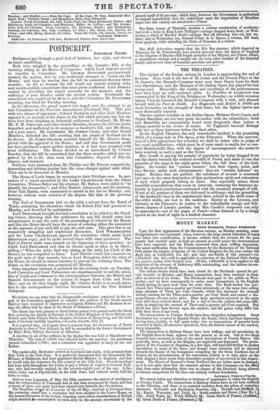POSTSCRIPT.
SATURDAY NIGHT.
Parliament got through a good deal of business, last night, and almost as much squabbling. Both were mingled in the proceedings on the Lunatics Bill, at the morning sitting in the House of Commons; which Lord ASHLEY moved to consider in Committee. Mr. THOMAS DUNCOMBE pertinaciously resisted the motion, first by two ineffectual attempts to "count out the House," and then by moving that the bill be committed that day three months : he did so because the bill would not remedy existing evils, and would establish a machinery that must prove inefficient. Lord ASHLEY replied by describing the urgent necessity for the measure, and the sufferings of poor lunatics under the present system. Eventually the amendment was negatived by 66 to 1; and the Committee, Mr. DUNCOMBE assenting, was fixed for Tuesday morning.
In the afternoon, the grand contest was waged over the attempt to go into Committee on the Poor-law Amendment (Scotland) Bill. This met with two classes of opponents: Colonel RAWDON and other Irish Members opposed it, on account of the clause in the bill which prevents any but na- tives born from obtaining an industrial settlement in Scotland; Mr. HUME, Mr. P. M. STEWART, and other Scotch Members, because the bill was crude, imperfect, and ineffectual to its purpose—a landlord's bill, said Mr. Hume, not a poor man's. Mr. LOCHHART, Mr. HENAN CRAIG, and other Scotch Members, defended the bill; averring that the people of Scotland are in its favour. Sir JAMES Gnanast consoled himself for Mr. Hume's disap- proval with the approval of the House; and said that Government could not have produced a more perfect measure, as it had been prepared with great deliberation. The House divided on an amendment by Colonel Rawdon, that the bill be committed that day three months; which was ne- gatived by 90 to 38: then went into Committee; disposed of fifty-six clauses; and resumed. Petitions were presented from Mr. Phillips and Mr. Parrott, respectively, demanding and inviting inquiry into the cross charges against each other. They are to be discussed on Monday.
The House of Lords began by recurring to their Privilege case. In pur- suance of a report presented by the LORD CHANCELLOR from the Select Committee, Thomas Baker and his attorney, Mr. Barnes, were called in "to identify the transaction"; and John Harlow, tobacconist, and his attorney, Peter Tait Hardin, were summoned to attend at the bar on Monday; not, however, without some renewal of the dispute like that of the previous evening. The Earl of Dstmorrsm laid on the table a minute from the Board of Trade, containing the alterations which Sir Robert Peel had promised on Monday, and described by anticipation.
Lord BROUGHAM brought forward a resolution to be added to the Stand- ing Orders, directing that the petitioners for any bill should enter into recognizances to pay the costs of the proceedings if ordered by the House, and that the House should have the power of ordering either the promoters or the opposers of any such bill to pay the said costs. This gave rise to an excessively straggling and unpleasant discussion. Lord WHARNCLIFFE and the LORD CHANCELLOR opposed the resolution; which made Lord BROUGHAM angry, and he spoke several times with some petulance. The Earl of DEVON made some remark on the frequency of these speeches: on which Lord BROUGHAM said that he should speak as often as he liked ; adding—" When the noble Earl was sitting at the table [as Clerk of the House] he was compelled to listen." Lord DEVON would not comment on the good taste of' that remark; but as Lord Brougham defied the rules of the House, he should in future interfere to prevent his violating them. The debate on the resolution was postponed till Monday.
Some important business is promised for the ensuing week: on Tuesday, Lord Clarendon and Lord Palmerston are simultaneously to call the atten- tion of Lords and Commons to the correspondence between the British and Spanish Governments on the subject of Sugars from Cuba and Porto Rico; and on the first Supply night, Mr. Charles Buller is to recall atten- tion to the correspondence between Government and the New Zealand Company.


























 Previous page
Previous page